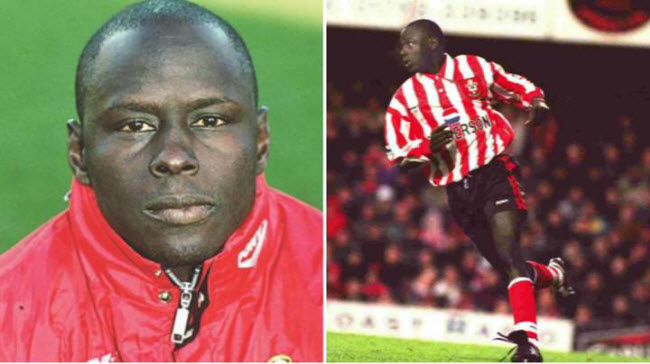Football is not just about running with the ball or scoring goals; it’s fundamentally a skillful sport. Throughout its history, many players have etched their names into the annals of the game thanks to the talent they were gifted. However, this does not preclude the appearance of some names in the sport through other avenues, including deceit of clubs. One such case involves a player known as Ali Dia, who is at the top of this list. He claimed to be the cousin of the legendary George Weah, the former AC Milan player who won the Ballon d’Or. Ali Dia managed to deceive Southampton FC and participate in an English Premier League match in 1996, which turned out to be his first and last appearance. His performance was so poor that he became known as one of the worst players to have participated in the history of the Premier League.
The story began in November 1996 when Southampton’s manager, Graeme Souness, received a phone call from someone claiming to be George Weah, the Liberian who was the best player in the world at the time and a Ballon d’Or winner. The caller recommended that Souness give a trial to his cousin, the Senegalese international striker Ali Dia. According to the caller, Dia had played with Weah at Paris Saint-Germain and had 13 international caps with Senegal. These statistics made Dia seem like an enticing prospect for Souness.

After the call, some rumors suggest that Graeme Souness did indeed watch Ali Dia play once in a five-a-side match before offering him a one-month trial contract with Southampton for £2,000. He was given the number 33 shirt and sat on the bench during Southampton’s match against Leeds United on November 23, 1996. Dia finally got his chance to showcase his skills to the audience after an injury to player Matt Le Tissier in the 32nd minute of the match. Dia came on as a substitute but his performance was notably poor, leading to his substitution in the 85th minute by Ken Monkou. The match ended with Leeds winning 2-0.

Le Tissier later commented that the first time he saw Dia was during training and noted Dia’s poor English and his underwhelming performance. There were rumors that Dia was Weah’s cousin, but Dia’s training performance was so poor that Le Tissier questioned his presence. During the match, Le Tissier was stunned by Dia’s performance, describing him as clueless and awkward on the field. The next day, Dia appeared at the club for treatment but never returned. When asked if he had questioned Souness about Dia, Le Tissier humorously admitted he lacked the courage to do so.
Dia was released after just 14 days of his contract. Graeme Souness remained somewhat embarrassed about the incident and did not mention it in his book published in 1999. Many rumors and stories circulated about how Dia managed to get to Southampton, with the consensus being that a university friend of his made the call to Souness. Even when George Weah was asked about Dia, he claimed not to know him, which was reasonable given that a Liberian player being the cousin of a Senegalese player seemed implausible.
As for Ali Dia’s career after his brief stint at Southampton, he managed to play for another club, Gateshead, which was in the English lower divisions. He also played eight matches for Northumberland, scoring two goals, one of which was in his debut. Dia later studied business management at Northumbria University in Newcastle, graduating in 2001. According to reports, he earned an MBA from San Francisco State University in 2003. After finishing his education, he is believed to have worked in the business sector in Qatar for a period and now lives in London. He has a son named Simon, who is a professional footballer for Cassiopeia FC based in Thailand.
In a press interview, Ali Dia mocked the accusations, stating that the club and the media portrayed him as a fraud. He claimed that he did indeed play for Paris Saint-Germain in the second division from 1986 to 1988, helping them win the Paris Cup. Dia said he met an African agent based in the UK named Beshir Suleiman in 1994, who secured the contract with Southampton for him. He also mentioned that Southampton knew of his skills through training with the Saints and that he scored two or three goals in a friendly match. He claimed to have helped Senegal win 3-1 against Guinea in the 1998 World Cup qualifiers, although this was not true since Senegal was eliminated in the first round of the qualifiers and did not face Guinea.
Due to his poor performance, Ali Dia was regularly featured in lists of worst players and bad transfers. He was ranked first in the Times’ list of “Worst 50 Footballers” and also appeared in ESPN’s list of the “Worst 50 Transfers in Premier League History.”
